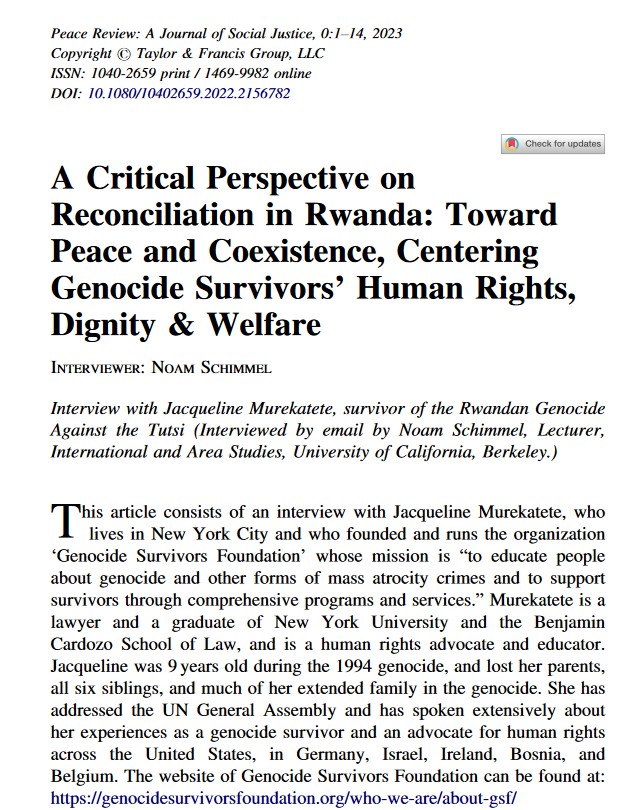
In a new paper in Peace Review, Noam Schimmel interviews Jacqueline Murekatete of Survivors Fund (SURF) partner organisation, Genocide Survivors Foundation, on “A Critical Perspective on Reconciliation in Rwanda: Toward Peace and Coexistence, Centering Genocide Survivors’ Human Rights, Dignity & Welfare”.
In the paper, Jacqueline shares her powerful view on reconciliation:
Personally, “reconciliation” is not a word or term that I use or find appropriate to use in post-genocide environments. Since I agree with those who see Genocide as the “crime of crimes,” as the worst crime that human beings can commit, the word “reconciliation” to me has always felt out of place or misplaced as a goal in post-genocide environments. Whenever I hear the word “reconciliation” the word to me always speaks to me or implies a level of coming together, of blending or of being ok with crimes that one should never be ok with. Therefore when speaking about post-genocide environments I have always preferred to use the word peaceful coexistence over the word reconciliation as the end goal. For me peaceful coexistence is about respecting every one’s basic human rights including their right to live peacefully alongside you even when you feel strongly about their crimes and express it to them as such. Reconciliation on the other hand always comes off to me as requiring that one be “ok” or pretend to be ok or to “forgive” the type of crimes which in my opinion I am not in a position to or should be expected to forgive.
Finally, whether you call the end goal or imagined outcome reconciliation or peaceful co-existence, I think it is very important to realize that there are pre-requisites to it, steps that must be taken to make it possible, and these steps include among other things; the existence of confession, repentance not just in words but in actions and accountability and justice for the victims. As far as my lived experience as a genocide survivor is concerned, I find that most of my fellow survivors and I are more interested in justice, in first having our needs met and getting the support we need to heal and rebuild our shattered lives before there is any conversation about reconciliation. To the many genocide survivors that I have interacted with, any talk or worse yet push toward reconciliation without first addressing/meeting survivors most basic needs and delivering the remedy that survivors are entitled to only further compounds survivors’ pain and suffering and is viewed as a form of re-victimization.
Jacqueline Murekatete, Peace Review, Noam Schimmel (2023): A Critical Perspective on Reconciliation in Rwanda: Toward Peace and Coexistence, Centering Genocide Survivors’ Human Rights, Dignity & Welfare, Peace Review
The full article can be accessed here.
